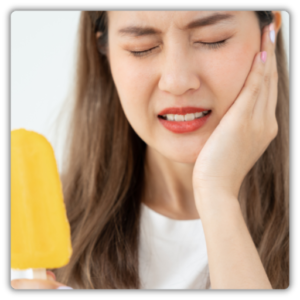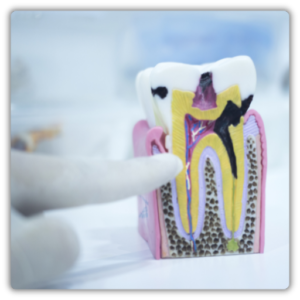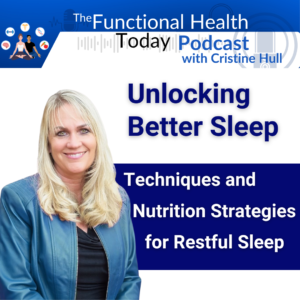What is tooth sensitivity and why does it happen?

KEY POINTS
Tooth sensitivity often occurs due to enamel erosion, gum disease, or teeth grinding, exposing the dentin and increasing discomfort from hot or cold foods and drinks.
Acidic foods and tooth decay are common contributors to sensitivity, as they erode enamel and expose nerve endings in the dentin, triggering pain.
Regular use of desensitizing toothpaste, professional treatments like fluoride applications, and personalized care plans can effectively alleviate sensitivity.
Proper oral hygiene, including brushing with a soft-bristled toothbrush and flossing, along with regular dental check-ups, can help prevent and manage sensitive teeth.

Pop in your email below, and we’ll zip it straight to your inbox so you never lose it!
What are the main causes of sensitive teeth?
How tooth decay contributes to tooth sensitivity
 Tooth decay is a common cause of tooth sensitivity, primarily affecting the tooth enamel and tooth root. As decay progresses, it can expose the inside of the tooth, leading to increased sensitivity when consuming acidic foods and beverages like hot coffee or soft drinks.
Tooth decay is a common cause of tooth sensitivity, primarily affecting the tooth enamel and tooth root. As decay progresses, it can expose the inside of the tooth, leading to increased sensitivity when consuming acidic foods and beverages like hot coffee or soft drinks.
This exposure can trigger sensitivity by allowing pain signals to reach the nerves, causing a sensation of pain during routine activities. Maintaining a proper hygiene routine with fluoride toothpaste can help reduce sensitivity and prevent further dental issues.
For those experiencing dental problems, a personalized treatment plan developed through functional medicine may be necessary to address the underlying causes of tooth sensitivity. Understanding how tooth decay affects different parts of the tooth can lead to effective treatment options for causing pain.
Impact of acidic foods on enamel and sensitivity
Consumption of acidic foods and drinks can significantly impact tooth enamel and lead to issues like tooth sensitivity. This erosion causes the underlying dentin to be exposed, triggering discomfort, as sensitivity is triggered when teeth can become more vulnerable due to poor oral hygiene.
To maintain a balanced oral environment, a good oral hygiene routine is essential. A dentist may recommend specific mouthwash or treatments tailored to individual needs. Ultimately, creating a personalized treatment plan is key to preventing further issues and managing teeth sensitive to temperature changes.
How gum recession leads to dental sensitivity
Gum recession can expose the dentin inside the tooth, leading to increased tooth sensitivity. As enamel and dentin are compromised, teeth may react to hot, cold, or sweet stimuli, causing discomfort.
The underlying periodontal issues can significantly lead to tooth sensitivity, emphasizing the importance of proper oral hygiene. Daily oral hygiene practices can help mitigate these effects.
Ultimately, the treatment will depend on the severity of the recession and the patient’s specific dental needs.
Bruxism: Clenching or grinding your teeth explained
Bruxism is a condition characterized by the involuntary clenching or grinding of teeth, often occurring during sleep. This repetitive motion can lead to several dental issues, including causing tooth sensitivity due to the wear on enamel. Over time, the pressure can result in situations where dentin is exposed, leading to further discomfort.
How can you treat sensitive teeth effectively?
Over-the-counter toothpaste for dental sensitivity
Professional treatments available at the dental office
Integrative approaches to managing tooth sensitivity involve a combination of strategies. Dietary modifications, such as reducing acidic foods, can help protect enamel. Additionally, topical treatments, like desensitizing toothpaste, offer relief. Regular dental check-ups and personalized care plans also play a critical role in alleviating discomfort effectively.
What oral health tips can help prevent sensitive teeth?
Importance of proper brushing techniques
 Proper brushing techniques are essential for maintaining oral hygiene and preventing dental issues. Using the right method helps remove plaque effectively, which can lead to cavities and gum disease if left unchecked. It’s vital to brush for at least two minutes, ensuring all surfaces of the teeth are covered. Additionally, the choice of toothbrush and toothpaste can significantly impact oral health. Soft-bristled brushes are generally recommended, as they are less abrasive on the gums. Regularly practicing these techniques not only keeps your smile bright but also contributes to overall health and well-being.
Proper brushing techniques are essential for maintaining oral hygiene and preventing dental issues. Using the right method helps remove plaque effectively, which can lead to cavities and gum disease if left unchecked. It’s vital to brush for at least two minutes, ensuring all surfaces of the teeth are covered. Additionally, the choice of toothbrush and toothpaste can significantly impact oral health. Soft-bristled brushes are generally recommended, as they are less abrasive on the gums. Regularly practicing these techniques not only keeps your smile bright but also contributes to overall health and well-being.
Flossing: A key part of your oral hygiene
Flossing is an essential component of your daily oral hygiene routine that often goes overlooked. Unlike brushing, which cleans the surface of your teeth, flossing reaches the tight spaces between them where plaque and food particles can accumulate. This practice helps prevent cavities and gum disease, promoting overall dental health. Regular flossing not only keeps your smile bright but also contributes to fresh breath, as it eliminates odor-causing bacteria that can linger in those hard-to-reach areas. By incorporating flossing into your daily regimen, you are taking a proactive step toward maintaining a healthy mouth and a confident smile.
Regular dental check-ups and their benefits
Regular dental check-ups are essential for maintaining optimal oral health. These visits allow dentists to identify potential issues early, such as cavities or gum disease, which can be more easily treated when caught in their initial stages. Additionally, professional cleanings performed during these appointments help remove plaque and tartar buildup, reducing the risk of tooth decay and bad breath.
Furthermore, regular visits can enhance overall well-being by linking oral health to systemic conditions like heart disease and diabetes. By prioritizing dental check-ups, individuals can ensure their smiles remain bright and healthy for years to come.
When should you consult a dentist for sensitive teeth?
Signs that indicate you need to visit a dental professional
If you experience persistent tooth pain or discomfort, it may be a sign that you should consult a dental professional. This pain can indicate underlying issues such as cavities, infections, or gum disease that require immediate attention. Additionally, if you notice bleeding gums during brushing or flossing, it’s crucial to seek help, as this could signal periodontal disease, which can lead to more severe health problems if left untreated.
Another indicator is a sudden change in tooth sensitivity. If hot, cold, or sweet foods cause discomfort, it’s essential to have your teeth evaluated. Furthermore, if you find yourself frequently suffering from bad breath that doesn’t improve with regular brushing or mouthwash, this could indicate an oral health issue that deserves professional assessment.
Possible treatment plans your dentist may suggest
When visiting your dentist, they may suggest a variety of treatment plans tailored to your oral health needs. Commonly, preventive care is emphasized, which includes regular cleanings, fluoride treatments, and sealants to minimize the risk of cavities and gum disease. If issues are detected, such as cavities or infections, your dentist might recommend restorative treatments like fillings, crowns, or root canals to restore the health of your teeth.
In cases of advanced periodontal disease, a periodontal treatment plan may involve deep cleaning procedures, scaling and root planing, or even surgical options if necessary. Your dentist may also discuss orthodontic treatments to correct misalignment, potentially suggesting braces or clear aligners to improve your bite and overall dental aesthetics.
Ultimately, the proposed treatment plan will be tailored to your specific condition, lifestyle, and preferences, ensuring the best possible outcomes for your dental health.
For those new to biohacking and looking for practical tips to get started, check out this article from Medical News Today about biohacks to try that can optimize your daily routine.
If you’re exploring breakfast options that align with intermittent fasting, here are 5 quick and easy ideas to help you start your day energized.











